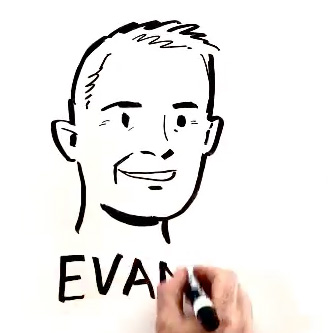It’s the “grand challenge” for the 21st century, says Evan Fraser. How to feed a projected global population of nine billion people by 2050? Now a project led by the Guelph geography professor aims to use new media to spark discussion and help find ways to feed all of those mouths.
In a newly launched website, Fraser analyzes global food security challenges and possible solutions. Featuring an animated video co-written by Fraser, the new site is intended to draw attention to world food issues.
Recent events point to a need to review our global food system, he says. Among them, he lists droughts in various countries and regions, food price shocks, environmental threats and growing demands from a ballooning population.
“This is the grand challenge for the 21st century, like nuclear brinkmanship or emancipation and civil rights,” says Fraser, who joined Guelph in 2010 as the Canada Research Chair (CRC) in Global Human Security.
His solution involves four factors.
1) In order to boost food production while conserving resources from water to fertilizer, we need to use science and technology, including better seeds and farm equipment.
2) Governments must use regulations and incentives to conserve food, produce more food without harming the environment and encourage the use of new technologies.
3) We need to focus on equitable food distribution worldwide and store more food. Fraser says, “There’s enough food in the world, but we use it in foolish ways.”
4) We need to encourage more local food production, not to feed the entire world population alone but to buffer against swings in the international food market.
Fraser compares these factors to parts of a balanced investment portfolio. Consider high-tech agriculture as high-risk, high-return growth stocks. Local food systems are like bonds and GICs. Storing food surpluses is akin to keeping an emergency cash reserve on hand.
He knows he’s not the only one paying attention to food security.
He figures he’s done about 100 unsolicited media interviews on the topic since arriving at U of G two years ago. “In the last 4½ years, food security has been front-page news. It demonstrates to me how interested the media and the public are in analysis and interpretation of this issue.”
The cover story of the December Walrus magazine will be an essay on the global food crisis written by Fraser and Boston-based journalist Andrew Rimas. They also co-wrote Empires of Food: Feast, Famine and the Rise and Fall of Civilizations, published in 2010.
That book and an earlier volume about meat production saw only middling sales, says Fraser. That’s what led him to consider new media to convey his message. The new website includes a 12-minute animated video on food security.
Fraser wrote the video narrative with his sister Elizabeth Fraser, partnership manager with Community Food Centres Canada in Toronto. “I hope this project will foster a deeper and more widespread dialogue about the global food crisis and its potential solutions,” she says.
So does Evan Fraser.
For example, one of his grad students is working with a non-governmental organization (NGO) in Haiti. Referring to prospective international sponsors, Fraser says, “I hope our website will connect someone interested in Haiti with that NGO.”
He says U of G itself is a hub of expertise in all aspects of the food system, including production, technology, nutrition, regulation, local food, international development and food science. He has discussed potential research projects with faculty in all seven colleges on campus and concludes: “The whole portfolio is here.”
Besides CRC funding, Fraser received website project support from the Ontario Agricultural College and the Department of Geography.
